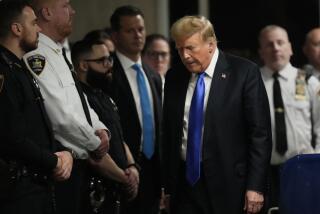Ex-Peru President Fujimori convicted of mass murder, kidnapping
- Share via
LIMA, PERU, AND SAN AGUSTIN, COLOMBIA — Former Peruvian President Alberto Fujimori was found guilty of mass murder and kidnapping Tuesday and was sentenced to 25 years in prison, a rare instance of a former head of state being found guilty in his own country on human rights charges.
The 70-year-old former agronomy professor, who during a decade in office brought Peru back from the brink of political and economic collapse, was found guilty of ordering massacres in the Barrios Altos area of Lima in 1991 and at La Cantuta University in 1992 that left 25 dead. He was also convicted in the 1992 abductions of a journalist and businessman.
The court decision was the latest twist in the saga of a leader who emerged from obscurity in 1990 to win the presidency amid national crisis, prevailing against entrenched politicians and novelist Mario Vargas Llosa, only to flee the country in 2000 as a corruption scandal unfolded.
The massacres were carried out by the so-called Colina group, a secret police unit that acted as a death squad. Fujimori maintained in emotional testimony last week that he was unaware of the group’s activities and that it was under the command of disgraced former spy chief Vladimiro Montesinos. But the court found that there was “no doubt” Fujimori authorized the creation of the unit.
The kidnapping charges involved the 1992 abductions of businessman Samuel Dyer and journalist Gustavo Gorriti, a vocal critic of Fujimori’s decision to shut down Congress and the courts during a state of emergency.
“This court declares that all four charges have been proved beyond all reasonable doubt,” presiding Judge Cesar San Martin told a hushed courtroom.
Fujimori, who in testimony before the court last week protested his innocence and portrayed himself as Peru’s savior, sat impassively, taking notes as the verdict was read.
The guilty verdicts, which were widely expected, were immediately hailed by victims’ families and human rights activists in Peru and abroad. Francisco Soberon, leader of the Aprodeh human rights group in Lima, which led the legal campaign to bring Fujimori to trial, said, “They couldn’t shut us up. . . . Our objective is to achieve full justice, remembrance and reparations.”
Maria McFarland, a researcher at New York-based Human Rights Watch who was present for the verdict, said, “With this ruling, and its exemplary performance during the trial, the Peruvian court has shown the world that even former heads of state cannot expect to get away with serious crimes.”
But the verdict was also criticized by the former president’s many supporters in Peru who revere his legacy. An estimated 500 orange-clad fujimoristas clashed with union members Tuesday morning in Ate Vitarte, a suburb of Lima, outside the military facility where the tribunal met to read the verdict.
Fujimori’s daughter, Keiko, is a congresswoman and a leading contender for the 2011 presidential race. In a recent interview, she said she believed that much of her support came from the nostalgia Peruvians feel for her father. She said that if elected, she would give her father a full pardon.
Fujimori was an inexperienced politician and president of Lima’s La Molina National Agrarian University when he became a late entry in the 1990 presidential race. Against all odds, and with strong support from a network of Christian evangelical churches, he won by presenting himself as the ultimate outsider.
He gained enormous popularity during his two terms in office with a stream of public works projects -- schools, waterworks and electrical systems -- in parts of Peru where the state had never established a presence. His daughter says he built an average of a school a day during his 10 years in office.
Fujimori also subdued the Shining Path, a leftist guerrilla group that controlled two-thirds of Peru when he took office and was on the verge of an assault on the capital. Armed forces captured founder Abimael Guzman in 1992 and succeeded in breaking the insurgent force with military strikes and local cooperation.
But Fujimori also entrusted much of the anti-terrorism effort to Montesinos, a shadowy figure who soon built a corrupt empire that involved the trafficking of arms, drugs and influence. The former spy chief is in prison.
Fujimori fled to Japan in 2000 after videotapes emerged showing Montesinos bribing judges and congressmen. Soon after arriving there, he faxed his resignation as president and embarked on a low-profile life in exile. Prosecutors in Peru, meanwhile, filed about 50 human rights charges against him.
But in late 2005, Fujimori gambled that he could leverage his popularity into a political return. He went to Chile hoping to use it as a jumping-off point to reenter Peru before the next presidential election. But Chilean authorities arrested him and a year later extradited him to Peru to face charges.
His critics say Fujimori went to Chile thinking that country wouldn’t extradite him. His daughter said in an interview with The Times that, to the contrary, her father expected to be arrested and hoped that the extradition process would strip away many of the charges against him, which turned out to be the case.
--
More to Read
Sign up for Essential California
The most important California stories and recommendations in your inbox every morning.
You may occasionally receive promotional content from the Los Angeles Times.










